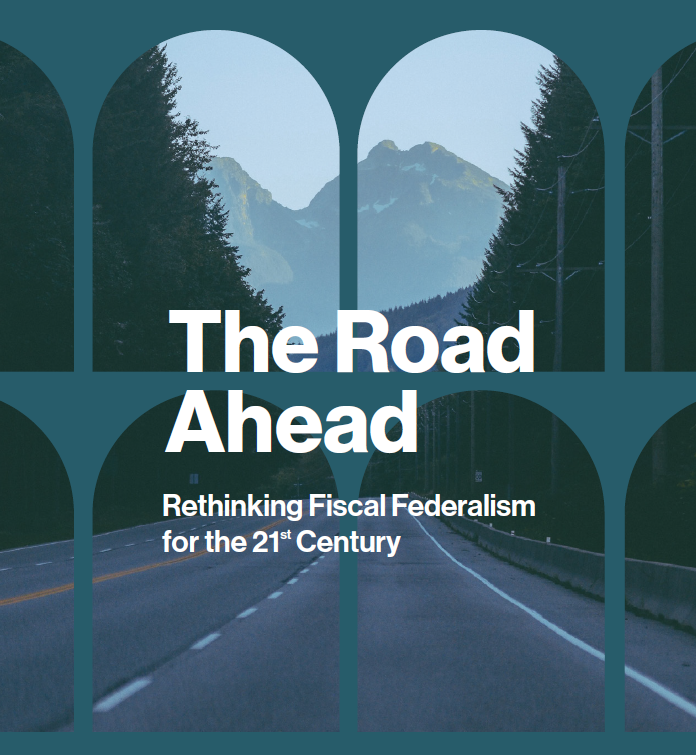The Road Ahead: Rethinking Fiscal Federalism for the 21st Century
Canada’s fiscal arrangements are at a crossroads. The immediate challenges from COVID-19 and the resulting fiscal and economic disruptions have amplified pre-existing pressures in several ways. And the importance of addressing future challenges in a sensible and prudent manner – before pressures build and crises arrive – is increasingly clear. Canada cannot effectively function as a disjointed and divisive federation. COVID-19 has shown us the best and worst of what a loose federation can offer. Effective fiscal relations will need to have a more integrated strategy that embraces open discourse and includes key partners in shaping the future of the country. Successful efforts to sustainably reform federal arrangements cannot only be top-down, but may require the public’s understanding, involvement, and support. To that end, the Fiscal Federalism Policy Network will spearhead efforts to investigate, analyse, and communicate to all Canadians the challenges, opportunities, strengths, and weaknesses of Canada’s current system of fiscal arrangements.
Improving how our federation operates will be at the heart of any successful effort to secure Canada’s future prosperity. Canada, after all, is not run by a single government in Ottawa, nor by thirteen provincial and territorial capitals. Instead, thousands of individual governments – each have distinct responsibilities, authority, governance structures, financial resources, and connections to Canadians – make this country run. All must work together for the country to succeed. This is especially true for challenges that transcend the ability of any individual government to address, many of which are becoming more significant by the day. Climate change, aging populations, global pandemics, energy transitions, technological advancements, natural disasters, economic volatility, rising perceptions of unfairness in the federation, and so much more will require much of Canada’s highly decentralized system of government. Who should do what (and who should pay for what) are central questions that we need to get right and that we need to adapt when necessary. Throughout our history, changing social, economic, technological, and political environments necessitated that our intergovernmental arrangements – and fiscal arrangements in particular – evolve. There is perhaps no more pressing critical juncture for Canada and Canadians in recent memory than ensuring that as we come through the other side of COVID-19, we think deeply about how we approach the countless other challenges on the horizon. Research, analysis, and above all a broad understanding of what we face and what we can do about it are needed.
The central objective of the Fiscal Federalism Policy Network is therefore to rethink the architecture of Canadian fiscal federalism in a post-COVID-19 world. Like a Royal Commission, we will take a coordinated deep dive into complex questions.
In this paper, we describe several of these challenges that Canada will soon face. Some result from external developments, such as a rapidly aging population, climate change, an energy transition that will alter the global demand for fossil fuels, and rising economic volatility in Canada. Others stem from deliberate internal policy choices, sometimes compounding over years. Rising levels of provincial debt raise long-term sustainability concerns, while recent moves by the federal government – accelerated by the pandemic – to increase involvement in areas traditionally under provincial jurisdiction, and the changing role of municipal governments in Canada are all areas where reforms may be necessary. And yet others reflect entrenched political dynamics that ebb and flow throughout Canada’s history and warrant special attention. Understanding how the federation operates today, and how these developing pressures challenge our current arrangements, requires rigorous and thoughtful analysis.
The central objective of the Fiscal Federalism Policy Network is therefore to rethink the architecture of Canadian fiscal federalism in a post-COVID-19 world. Like a Royal Commission, we will take a coordinated deep dive into complex questions. Unlike a Royal Commission, we are independent of government appointments or political priorities. We believe that this is the only way to provide evidence-based research, analysis, and advice in order to strengthen and modernize Canada’s intergovernmental fiscal relations. To achieve this objective, we will be guided by a set of four interconnected principles:
- Work within Canada’s existing constitutional framework. Much can be done within the existing constitutional framework, which has proven to be remarkably flexible in accommodating the evolution of the federation. While not recommending changes to the constitution we recognize the need to involve municipalities more fully.
- Retain Canada’s fiscally decentralized federation. A decentralized federation fosters innovation and accommodates regional differences while providing the benefits of a centralized federal government and pan-Canadian coordination of efforts. Provinces and municipalities should have sufficient fiscal capacity to deliver critical public services.
- Promote fiscal transparency and accountability. Clear and transparent connections between revenue and spending can enhance accountability and hold each order of government responsible for outcomes. Disentangling overlapping tax and expenditure powers will improve transparency and accountability.
- Create an efficient, sustainable and fair fiscal federation. Increasing the efficiency and effectiveness of the federation improves productivity and fosters greater economic growth and prosperity. Growth supports the financing of public services and policies to address income disparities and promotes social cohesion. An efficient and fair federation requires a sustainable approach to addressing vertical and horizontal fiscal imbalances.
As a starting point, over the next three years, the Network will tackle these issues with a series of in-depth research papers, broadly accessible briefing notes, public events, and a host of other activities to elevate the public debate and understanding of these critical issues. Given the significant challenges facing Canada, we need to stress test how our existing institutions can effectively deal with these issues in a highly competitive global economy. Do we have effective and resilient decision-making structures to guide Canada during these unprecedented times? Do we need new coordinating efforts to challenge the status quo and innovate as a federation? How can we realign intergovernmental roles and responsibilities to improve our quality of life and global competitiveness? These are some of the important questions that the Network will address. Our future prosperity depends on getting this right.












